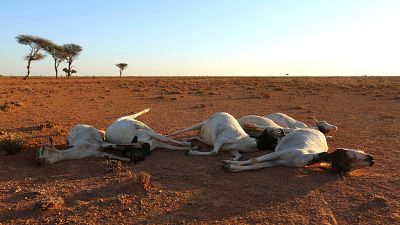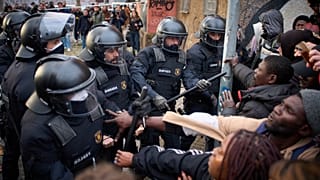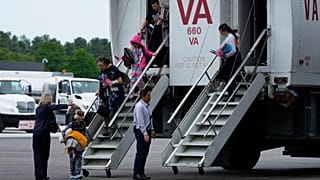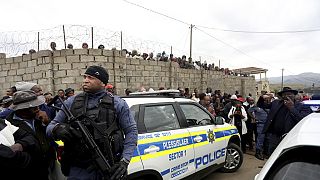Africa famine
Somalia risks slipping back into famine, the United Nations said on Tuesday (January 17), as worsening drought has left millions of people without food, water or healthcare in a country crippled by decades of war.
Five million Somalis, or more than four out of 10 residents, do not have enough to eat because of poor rains and fighting between the Islamist militant group al Shabaab and Somalia’s African Union-backed government.
Famine last struck pockets of Somalia in 2011, killing 260,000 people. It was caused by drought, conflict and a ban on food aid in territory held by al Shabaab.
Researchers say many indicators like those seen in 2011, such as rising food prices and falling livestock prices, have reappeared and April rains are predicted to be poor.
“We have a very serious drought situation at the moment in Somalia; in fact 5 million people in this country, which is more than 40 percent of the population are currently in need of food aid because they don’t have enough to eat, so this is a result of the fourth consecutive drought season. We did not have enough rains so it is going to take, as we know, another four months before we have another rainy season and that’s going to be very difficult period for people like this and we will see more and more people arriving in this kind of camps so they need assistance to help them throughout this season and then hopefully also it is going to be assistance for them to restart their lives and that is going to be much more difficult. This is just humanitarian aid, it is short term aid – but in the long term these people need to get their livelihood again,” said U.N.‘s humanitarian co-ordinator for Somalia, Peter de Clercq.
“I came from Buula Iir village to escape the harsh conditions there. We don’t have food, water, and clothes. Our farms are barren, our livestock are dead, and our men cannot find any work to do. I lost my son because I couldn’t find any food or water to give him, now another one is also in hospital. I also lost 12 members of my family. We are in so much despair; this morning, we did not cook anything because I have nothing to feed my children. They are here crying. We urgently need food, water and medicine,” said displaced woman, Quresha Abdi Ali.
The United Nations Office for the Co-ordination of Humanitarian Affairs (UNOCHA) has launched a 864 million USD humanitarian response plan for Somalia in 2017 that will target an estimated 3.9 million Somalis.
The plan was launched on Tuesday in the capital Mogadishu during the Humanitarian Response Plan conference attended by government, UN and diplomatic officials.
“The Somali Federal Government is committed to do its level best to ensure a timely and well-coordinated response to the drought. We are working closely with humanitarian organisations and have already put in place drought response mechanisms. A national drought co-ordination committee led by the deputy Prime Minister is established and will be responsible for policy setting and strategic guidance,” said parliament speaker, Mohamed Sheikh Osman Jawari.
The crisis will be a major test for the new government in Somalia, which is in the process of electing a president.














00:24
South Sudan families battle rising Nile floods to survive
01:48
United States: Vermont school district receives threats after putting up Somali flag
01:02
First rain of autumn falls in Iran's capital after months of intense drought
01:00
Trump deportation push sparks clashes in Minneapolis
02:19
Somalia's poets keep hope alive for storytelling and for peace
01:00
Pix of the Day: December 8 , 2025